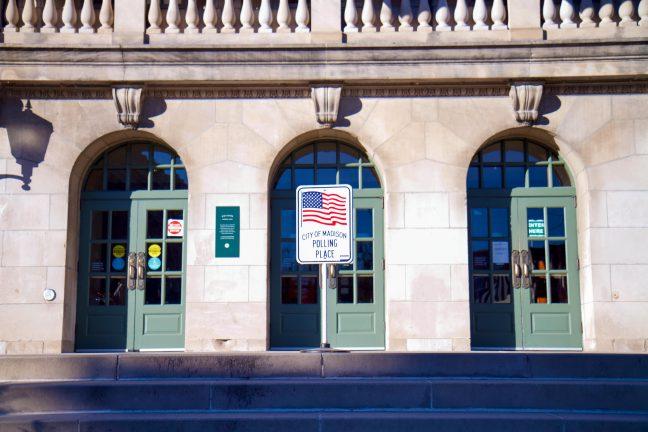The legal advocacy group Free Speech for People, on behalf of Wisconsin’s League of Women Voters, filed a request Oct. 15 to the U.S. and Wisconsin Department of Justice regarding threatening text messages that were sent to young voters, according to the request letter.
The texts warned the recipients not to vote in a state where they’re not eligible to vote, according to the request letter. The texts read, “WARNING: Violating WI Statutes 12.13 & 6.18 may result in fines up to $10,000 or 3.5 years in prison. Don’t vote in a state where you’re not eligible. STOP2END.”
Statute 6.18 deals with Wisconsin residency requirements and Statute 12.13 prohibits election fraud, such as voting without proper qualifications or tampering with ballots.
Executive Director of the League of Women Voters of Wisconsin Debra Cronmiller said the League is a non-partisan political organization that aims to inform voters and defend democracy. Cronmiller said the league has been working to identify different election threats but was still surprised to hear about the messages.
“I honestly didn’t see it coming that it would be so blatant as that intimidating text message,” Cronmiller said.
Cronmiller said the texts were sent to 18 to 25-year-olds, including students at various Wisconsin campuses and two staff members at the League of Women Voters. The group does not know the exact number of recipients, but it could be anywhere from 500 to 10,000 people, Cronmiller.
The League took action immediately once they were informed of the texts, Cronmiller said. Within 48 hours, the League and Free Speech for People had drafted and sent a letter to the federal U.S. Attorney General Merrick Garland and Wisconsin Attorney General Josh Call, Cronmiller said.
The letter requested the department to investigate the sender of the message, make the identity of the perpetrators public and take proper action against them, according to Cronmiller.
Cronmiller said the League does not have any particular suspicions about who sent the text message.
University of Wisconsin political science professor and affiliate faculty member of the UW Law School Howard Schweber said he believes there is an obvious answer as to who the text messages are meant to benefit.
“I think, clearly, this is being done to help Trump and the Republicans,” Schweber said. “There’s an assumption that young voters tend to vote for Democratic candidates — so the attempt [of the texts] is to suppress the youth vote.”
Director of the UW School of Journalism and Mass Communication Kathleen Bartzen Culver said she hopes the texts won’t influence young voters and said the message recipients likely also received a “cacophony” of election-related messages.
“Ultimately, I hope that this is quite unsuccessful because kids who got it also received — ‘Hey, turn out for this rally,’ ‘Hey, did you register to vote yet?’ and ‘Hey, do you want to make this micro-donation?’” Culver said.
Culver said the widespread distribution of texts is likely less threatening than an individual text, but she said that does not excuse the severity of the situation.
The texts could have a chilling effect, but the texts could also motivate young people to exercise their right to vote, Culver said.
“I hope that there will be enough young voters speaking out and letting each other know that these are false and that it is an attempt to suppress their vote,” Culver said. “And they will perhaps be even more likely to vote, given that someone’s trying to take that right away from them.”
Cronmiller said he suspects younger voters were targeted by the messages because the 2024 presidential election is likely to see a surge of the youth vote.
The young voter demographic is typically a lower turnout demographic, but certain elections have seen a higher turnout of young voters, like the 2022 midterm elections and 2008 presidential election, Cronmiller said.
The 2022 midterm election had the second-highest youth voter turnout in almost three decades with 27% of voters ages 18-29 casting a ballot, according to a Tufts University analysis.
In a swing state like Wisconsin, if even a relatively small number of young voters who would otherwise have voted for a Democratic candidate don’t vote, that could be enough to change an outcome, Schweber said.
Culver said these attempts to spread distrust in election systems are highly concerning.
“It really doesn’t matter what the motivation is, right?” Culver said. “The outcome is suppression of a legal right to vote and that’s the problem.”
Efforts like these text messages can cause voters and citizens to lose trust in the electoral system — which is how democracies fail, Schweber said.
Schweber said he believes it is absolutely crucial to strengthen voter protection laws, especially regarding technology.
“We need to think about legal and political remedies, not by silencing people’s voices, but by diminishing the corrosive effect of people’s voices on our democracy writ large,” Schweber said.
Cronmiller said the next step in this case is identifying who sent the text messages and once they are identified, the attorneys in consultation with the League will determine the course of action.



